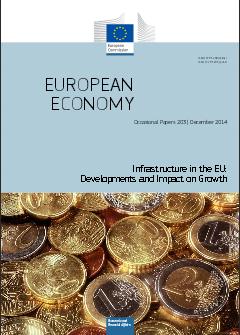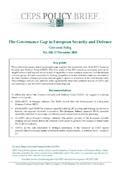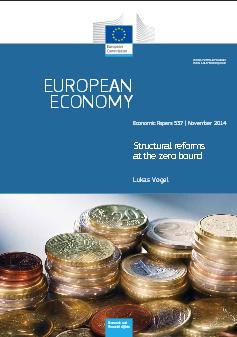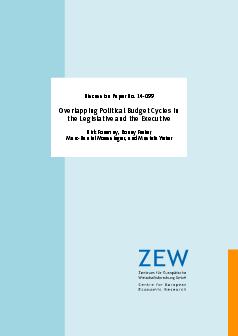Europe: When the Unthinkable Becomes Possible, Geopolitical Diary – STRATFOR Global Intelligence, 03 Δεκεμβρίου. Europe’s economic crisis is slowly but steadily eroding the political systems of many countries on the Continent. New actors are emerging and threatening the supremacy of the traditional players. Alliances and events that seemed impossible only a few years ago are now being openly discussed across Europe. On Dec. 3, for example, Sweden announced it …Read More
Infrastructure in the EU: Developments and Impact on Growth
Brons, Μ., Kalantzis, F., Maincent, E. & Arnoldus, P. (2014) “Infrastructure in the EU: Developments and Impact on Growth“, European Economy – Occasional Papers–No. 203, European Commission Publications, Δεκέμβριος 2014: Βρυξέλλες. Today, investment needs are high in areas such as research, innovation and ICT which are important drivers of growth and competitiveness. However, there are also arguments to suggest that Europe should invest in energy and transport infrastructure. Energy …Read More
Investment as the key to recovery in the euro area?
Gros, D. (2014) “Investment as the key to recovery in the euro area?“, Economic Policy, CEPS Policy Briefs Νο. 34, 18 Νοεμβρίου. Investment has declined in the euro area since the start of the economic and financial crisis, but this does not mean that there is necessarily an ‘investment gap’, explains Daniel Gros in this CEPS Policy Brief. Investment was probably above a sustainable level due to the credit …Read More
Structural reforms at the zero bound
Vogel, L. (2014) “Structural reforms at the zero bound“, European Economy – Economic Papers. Νο. 537, European Commission Publications, Νοέμβριος 2014: Βρυξέλλες. This paper uses the European Commission’s QUEST macroeconomic model to analyse the impact of structural reforms on economic activity in an environment in which the zero bound on monetary policy rates is temporarily binding. The simulations suggest that although such reforms can have a negative impact on …Read More
Addressing long-term unemployment in the aftermath of the Great Recession
Katz, F. L., Kroft, K., Lange, F. & Notowidigdo, M. (2014) “Addressing long-term unemployment in the aftermath of the Great Recession“, VoxEU Organisation, 03 Δεκεμβρίου. In the aftermath of the Great Recession, there remains a large number of long-term unemployed across countries. This column argues that policies targeting the long-term unemployed, if effective, may have substantial benefits for the aggregate labour markets. However, evidence of the effectiveness of active …Read More
The logic behind the German Euro gamble
Fatas, A. (2014) “The logic behind the German Euro gamble“, Antonio Fatas on the Global Economy Blog, 02 Δεκεμβρίου. In the current economic policy debate in Europe there seems to be an increasing polarization between the German view and the view of the other countries. How did we end up with such polarized views of the world? What is the basis for the apparent German stubbornness to change their …Read More
The inexact science of calibrating fiscal policy
Mitchell, B. (2014) “The inexact science of calibrating fiscal policy“, Bill Mitchell Blog: Modern Monetary Theory … macroeconomic reality, 02 Δεκεμβρίου. In the showdown between France and the European Commission last week, France clearly is the winner on points, which is not surprising given the impossibility of the task the Commission had set it in meeting the Excessive Deficit Procedure (EDP) rules and the danger to the latter if …Read More
The European Commission’s stronger role in economic governance has made it an unexpected ‘winner’ from the Eurozone crisis
Bauer, W. M. & Becker, S. (2014) “The European Commission’s stronger role in economic governance has made it an unexpected ‘winner’ from the Eurozone crisis“, LSE EUROPP, 02 Δεκεμβρίου. Several commentators have argued that the Eurozone crisis has resulted in more intergovernmental EU decision-making, with the European Commission in particular being weakened by the role taken on by the European Council in the area of economic governance. Michael W. …Read More
Overlapping Political Budget Cycles in the Legislative and the Executive
Foremny, D. Freier, R., Moessinger, Μ. D. & Yeter, Μ. (2014) “Overlapping Political Budget Cycles in the Legislative and the Executive“, Discussion Paper No. 14-099, Centre for European Economic Research, Δεκέμβριος. Abstract We advance the literature on political budget cycles by testing separately for cycles in expenditures for elections in the legislative and the executive. Using municipal data, we can separately identify these cycles and account for general year …Read More
The loaded language of austerity – but all the sinners are saints!
Mitchell, B. (2014) “The loaded language of austerity – but all the sinners are saints!“, Bill Mitchell Blog, 27 Νοεμβρίου. The US National Institute of Justice tells us that – Recidivism is “is one of the most fundamental concepts in criminal justice. It refers to a person’s relapse into criminal behavior, often after the person receives sanctions or undergoes intervention for a previous crime”. You know murder, rape, theft, …Read More








